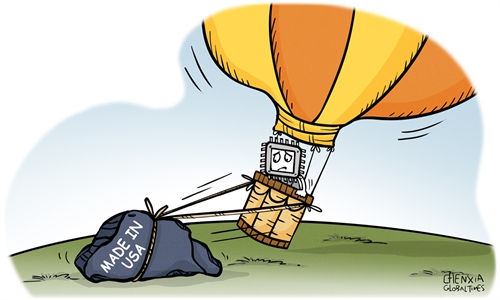
chip Photo:VCG
The Netherlands has shown some resistance toward US pressure aimed at persuading allies to join its campaign for keeping advanced chip technologies from China, a manifestation of vigilance that actually reflects the attention to the interest of its own companies.Dutch Foreign Trade Minister Liesje Schreinemacher said in a recent interview that the US shouldn't expect the Netherlands to unquestionably adopt its approach to China export restrictions, Bloomberg reported on Saturday.
"We make our own assessment - and we do this in consultation with partner countries such as Japan and the US," she said.
While it is uncertain whether the Netherlands will introduce any new export controls on China in the future, if, as the minister said, the country does stick to its own judgment rather than following the US on export curbs over China, that seems like a good sign, not just for Chinese firms but also for the European country's own companies.
The Netherlands has the world's largest photolithography equipment supplier to the semiconductor industry, ASML, which is also key to Washington's push for a new technology embargo over China. ASML is already prohibited from selling the most advanced photolithography machines to China, but it is still allowed sell those less sophisticated ones to Chinese customers. But after the US announced in early October a series of new export controls over semiconductor technologies and products to China, it is seeking to pressure the Dutch government to prevent ASML from selling any photolithography machine to China on the grounds of blocking China's access to advanced chip technology, according to media reports.
There is no denying some in the Netherlands may have some concerns over China trade under US lobbying, but it remains important to note that cutting ASML's access to the Chinese market may be even less in the Netherlands' national interests. The Chinese market accounts for a considerable share of ASML's sales.
In fact, what American semiconductor stocks have been undergoing after Washington escalated its chip crackdown on China is sufficient enough to suggest why the Dutch government is so reluctant to follow the US lead on export controls. The global semiconductor sector is heading toward a downturn amid the weakening global demand, which is expected to hit the revenues of most companies in the sector. At this juncture, the escalation of US crackdown against China will further undermine market confidence.
The US attempt to rope in allies to contain China's chip development will only split the industrial chain, and the zero-sum game will see no winner, but only losers.
Under these circumstances, the Dutch government's top priority should be to preserve and improve the competitiveness of its own semiconductor sector at times of market turmoil, instead of undercutting the development potential of ASML and other Dutch companies because of so-called security concerns. Indeed, companies know the best as to how to protect their own interests. Therefore, less political meddling and allowing companies to navigate the market themselves may be most in line with the Netherlands' national interests.
It is not just the Netherlands, but the Europe as a whole that needs to think about whether they should copy the US approach toward China. Some European politicians like to play up "national security" when it comes to technology deals involving China. For instance, the UK government recently ordered a Chinese-owned company to unwind its takeover of Britain's chipmaker Newport Wafer Fab. If anything, the abuse of the "national security" concept will not only deprive companies of much-needed investment, but also undermine the development potential of a country's technology sector.
This is what European countries need to be vigilant about. The US' strengthened control of global tech sector is aimed at maintaining its own hegemony and interests, which has actually led to serious consequences for the global industrial chain, while dealing a heavy blow to the development of its allies in particular. Only by following Europe's own interests and seeking cooperation can the continent find the right way forward.



